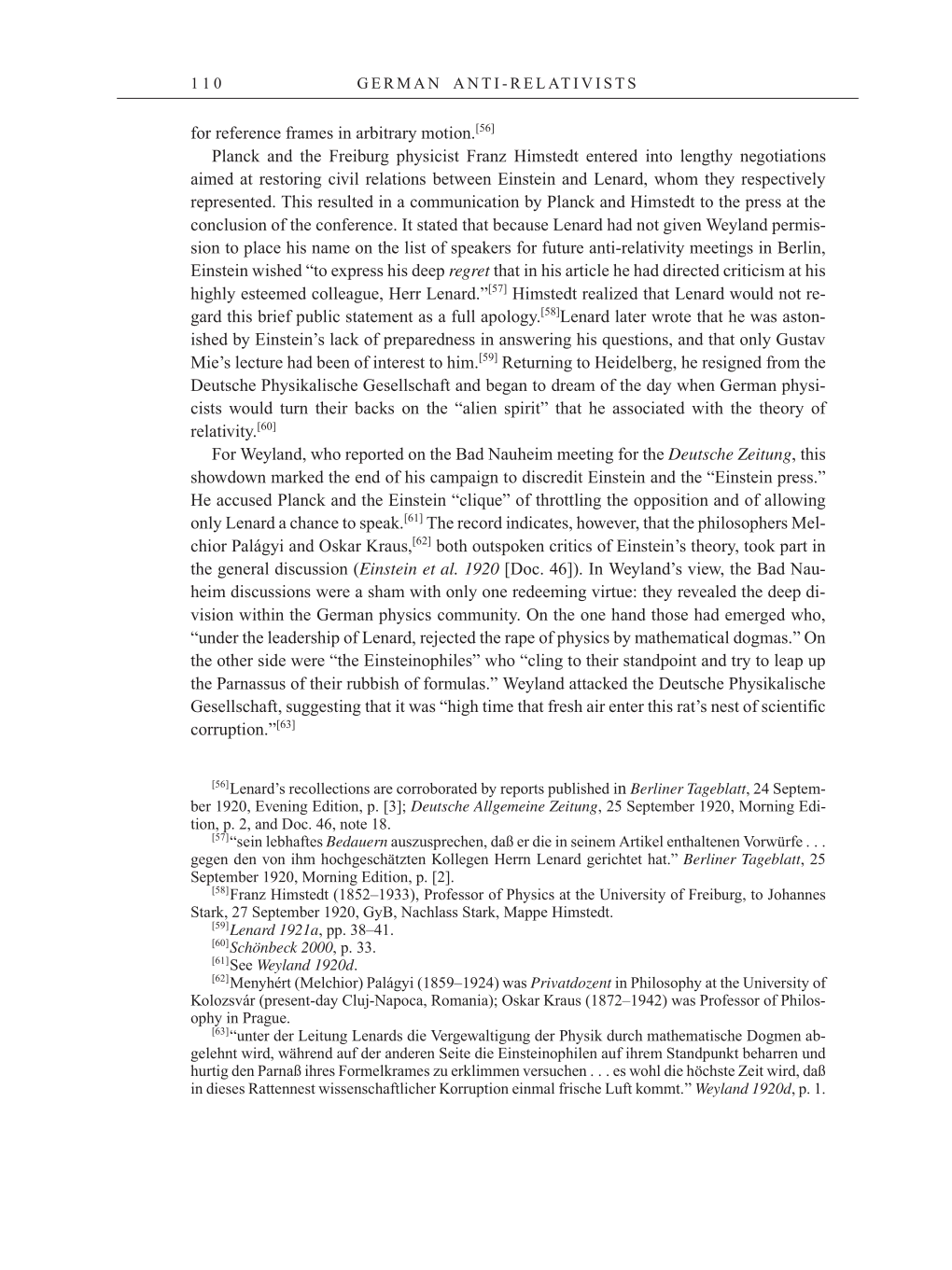1 1 0 G E R M A N A N T I - R E L AT I V I S T S
for reference frames in arbitrary
motion.[56]
Planck and the Freiburg physicist Franz Himstedt entered into lengthy negotiations
aimed at restoring civil relations between Einstein and Lenard, whom they respectively
represented. This resulted in a communication by Planck and Himstedt to the press at the
conclusion of the conference. It stated that because Lenard had not given Weyland permis-
sion to place his name on the list of speakers for future anti-relativity meetings in Berlin,
Einstein wished “to express his deep regret that in his article he had directed criticism at his
highly esteemed colleague, Herr
Lenard.”[57]
Himstedt realized that Lenard would not re-
gard this brief public statement as a full
apology.[58]Lenard
later wrote that he was aston-
ished by Einstein’s lack of preparedness in answering his questions, and that only Gustav
Mie’s lecture had been of interest to
him.[59]
Returning to Heidelberg, he resigned from the
Deutsche Physikalische Gesellschaft and began to dream of the day when German physi-
cists would turn their backs on the “alien spirit” that he associated with the theory of
relativity.[60]
For Weyland, who reported on the Bad Nauheim meeting for the Deutsche Zeitung, this
showdown marked the end of his campaign to discredit Einstein and the “Einstein press.”
He accused Planck and the Einstein “clique” of throttling the opposition and of allowing
only Lenard a chance to
speak.[61]
The record indicates, however, that the philosophers Mel-
chior Palágyi and Oskar
Kraus,[62]
both outspoken critics of Einstein’s theory, took part in
the general discussion (Einstein et al. 1920 [Doc. 46]). In Weyland’s view, the Bad Nau-
heim discussions were a sham with only one redeeming virtue: they revealed the deep di-
vision within the German physics community. On the one hand those had emerged who,
“under the leadership of Lenard, rejected the rape of physics by mathematical dogmas.” On
the other side were “the Einsteinophiles” who “cling to their standpoint and try to leap up
the Parnassus of their rubbish of formulas.” Weyland attacked the Deutsche Physikalische
Gesellschaft, suggesting that it was “high time that fresh air enter this rat’s nest of scientific
corruption.”[63]
[56]Lenard’s recollections are corroborated by reports published in Berliner Tageblatt, 24 Septem-
ber 1920, Evening Edition, p. [3]; Deutsche Allgemeine Zeitung, 25 September 1920, Morning Edi-
tion, p. 2, and Doc. 46, note 18.
[57]“sein lebhaftes Bedauern auszusprechen, daß er die in seinem Artikel enthaltenen Vorwürfe . . .
gegen den von ihm hochgeschätzten Kollegen Herrn Lenard gerichtet hat.” Berliner Tageblatt, 25
September 1920, Morning Edition, p. [2].
[58]Franz Himstedt (1852–1933), Professor of Physics at the University of Freiburg, to Johannes
Stark, 27 September 1920, GyB, Nachlass Stark, Mappe Himstedt.
[59]Lenard 1921a, pp. 38–41.
[60]Schönbeck 2000, p. 33.
[61]See Weyland 1920d.
[62]Menyhért (Melchior) Palágyi (1859–1924) was Privatdozent in Philosophy at the University of
Kolozsvár (present-day Cluj-Napoca, Romania); Oskar Kraus (1872–1942) was Professor of Philos-
ophy in Prague.
[63]“unter der Leitung Lenards die Vergewaltigung der Physik durch mathematische Dogmen ab-
gelehnt wird, während auf der anderen Seite die Einsteinophilen auf ihrem Standpunkt beharren und
hurtig den Parnaß ihres Formelkrames zu erklimmen versuchen . . . es wohl die höchste Zeit wird, daß
in dieses Rattennest wissenschaftlicher Korruption einmal frische Luft kommt.” Weyland 1920d, p. 1.
